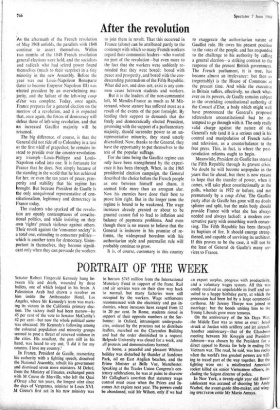After the revolution
tAs the aftermath of the French revolution of May 1968 unfolds, the parallels with 1848 continue to assert themselves. Within two months of the 1848 French revolution general elections were held, and the socialists and radicals who had seized power found themselves (much to their surprise) in a tiny minority in the new Assembly. Before the year was out Louis-Napoleon Bonaparte (later to become Emperor Napoleon III) was elected president by an overwhelming ma- jority, and the failure of the left-wing coup d'etat was complete. Today, once again, France prepares for a general election on the morrow of a revolution, and it is expected that, once again, the forces of democracy will defeat those of left-wing revolution, and that an increased Gaullist majority will be returned.
The big difference, of course, is that the General did not ride off to Colombey in a taxi at the first whiff of grapeshot; he remains in- stead to preside over the counter-revolution- ary triumph—Louis-Philippe and Louis- Napoleon rolled into one. It is fortunate for France that he does. Not simply because of the standing in the world that he has achieved for her, or even the ten years of peace, pros- perity and stability that his regime has brought. But because President de Gaulle is the only unequivocal representative of con- stitutionalism, legitimacy and democracy in France today.
The students who sparked off the revolu- tion are openly contemptuous of constitu- tional politics, and while insisting on their own 'rights' preach violence against others. Their revolt against the 'consumer society' is a total one, extending to consumer politics— which is another term for democracy. Unim- portant in themselves, they become signifi- cant only when they can persuade the workers to join them in revolt. That this occurred in France (alone) can be attributed partly to the contempt with which so many French workers regard their communist leaders—who wanted no part of the revolution—but even more to the fact that the workers were suddenly re- minded that they were bored : bored with peace and prosperity, and bored with the con- descending paternalism of the Fifth Republic. What did not, and does not, exist is any com- mon cause between students and workers.
But it is the leaders of the non-communist left, M Mendes-France as much as M Mit- terrand, whose stature has suffered most as a result of the events of the past fortnight. By lending their support to demands that the freely and democratically elected President, governing with the support of a parliamentary majority, should surrender power to an un- representative minority, they stand utterly discredited. Now, thanks to the General, they have the opportunity to put themselves to the test of the popular suffrage.
For the time being the Gaullist regime can only have been strengthened by the experi- ence it has been through. When, in the 1965 presidential election campaign, the General described the choice before the French people as one between himself and chaos, it seemed little more than an arrogant slur. Now his enemies have done their best to prove him right. But in the longer term the regime is bound to be weakened. The wage increases already granted or about to be granted cannot fail to lead to inflation and balance of payments problems. And even though there is no reason to believe that the General is insincere in his promise of re- forms, the widespread boredom with his authoritarian style and paternalist rule will probably continue to grow.
It is, of course, customary in this country to exaggerate the authoritarian nature of Gaullist rule. He owes his present position to the votes of the people, and has responded to the challenge to his authority by calling a general election—a striking contrast to the response of the present British government. The French parliament, it is true, has become almost an irrelevance : but then so (regrettably) is the House of Commons at the present time. And while the executive in Britain suffers, effectively, no check what- ever on its powers, de Gaulle remains subject to the overriding constitutional authority of the Conseil d'Etat, a body which might well have pronounced the General's proposed referendum unconstitutional had he at- tempted to go through with it. The only really valid charge against the nature of the General's rule (and it is a serious one) is his control and manipulation of French radio and television, as a counterbalance to the free press. This, in fact, is where the post- revolution reforms ought to begin.
Meanwhile, President de Gaulle has steered the Fifth Republic through its gravest crisis. No doubt he will become unpopular in the years that lie ahead, but there is now reason to hope that the transfer of power, when it comes, will take place constitutionally at the polls, whether in 1972 or before, and not prematurely by a coup d'etat. The Gaullist party after de Gaulle has gone will no doubt splinter and split, but the main body should provide France with what she has always needed and always lacked: a modern con- servative party with something worth conser- ving. The Fifth Republic has been through its baptism of fire. It should- emerge streng- thened, and capable of surviving its architect. If this proves to be the case, it will not be the least of General de Gaulle's many ser- vices to France.






































 Previous page
Previous page